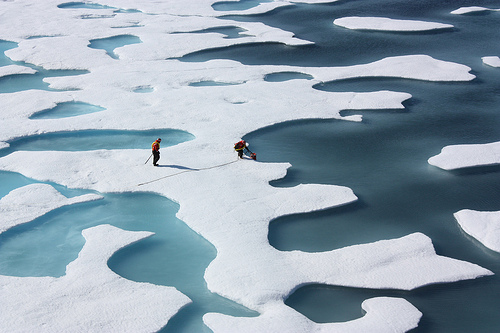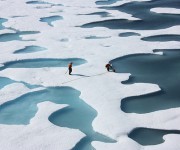 Photo: NASACross-posted from ThinkProgress Green.
Photo: NASACross-posted from ThinkProgress Green.
Jane Lubchenco, a top marine ecologist and senior Obama administration official, is concerned that opening the Arctic to oil and gas development brings unknown risks to human civilization.
In an exclusive interview with ThinkProgress Green, Lubchenco, the administrator of the National Oceanic and Atmospheric Administration (NOAA), discussed the vicious circle of oil and gas greenhouse pollution melting the Arctic sea ice, making it possible for new oil and gas drilling in the region that will melt the ice even faster. Lubchenco had just appeared in a panel on threats to oceans at the Society of Environmental Journalists annual conference on Friday morning, discussing ocean acidification and the unexpectedly rapid decline of Arctic sea ice, both results of greenhouse pollution from burning fossil fuels.
“Less sea ice means greater access to reserves for gas and oil that are there,” Lubchenco said in the ThinkProgress Green interview, agreeing that “increased production of oil and gas means less sea ice.” When asked whether there are civilizational risks to a world without permanent Arctic sea ice, Lubchenco explained that:
Well, what happens in the Arctic doesn’t stay in the Arctic. It has huge implications for the global system. And one of the reasons people are legitimately concerned about melting of sea ice are the uncertainties associated with the consequences of that for the rest of the planet. We’re entering a no-analogue world here. We’ve never experienced the kinds of changes that we’re seeing now in the Arctic and elsewhere. And we don’t fully understand what the consequences of that are going to be.
Watch the interview:
The United States and other nations with access to the Arctic are taking steps to support the expansion of drilling in regions made accessible by global warming pollution. Although Norway is concerned about the costs of a Deepwater Horizon-like disaster, the government is still encouraging Arctic drilling. In August, Exxon Mobil signed a blockbuster deal with Russia’s Rosneft to explore the Russian reaches of the Arctic ocean for oil. This month, the Department of Interior announced it is moving forward with 500 oil drilling leases sold during the Bush administration for the Chukchi Sea. Last week, the Environmental Protection Agency granted Shell an air permit for exploratory drilling in the Beaufort Sea.
The Arctic Ocean is estimated by the U.S. Geological Survey to have vast reserves of oil and gas [PDF]. Burning of those fossil fuels would add tens of billions of tons of carbon dioxide to our already overheated atmosphere.
Although NOAA is the nation’s top oceanographic agency, its scientists play only a minor, advisory role in the government’s approval of offshore drilling, which is run by the Interior Department. NOAA plays a larger role in cleaning up after oil spills.
Transcript:
TP GREEN: One of the things that people are talking about was the question of Arctic sea ice decline and positive feedbacks. Is it fair to characterize oil and gas exploration that’s opened up because of declining sea ice in the Arctic and thus increasing the amount of carbon dioxide emissions in the atmosphere, is that reasonable to call that another positive feedback loop —
LUBCHENCO: [Laughter.]
TP GREEN: — another manmade feedback?
LUBCHENCO: That’s an interesting way to frame it. You know, I think regardless of that the challenges are how do you provide clean energy for the country that addresses our energy security needs while also addressing the realities of climate change. And they’re really in a transition now and there are a lot of different things to be balanced.
TP GREEN: In all seriousness, looking at it from a global civilizational perspective, because the question of Arctic drilling is not solely a U.S. one, but a global one —
LUBCHENCO: Absolutely.
TP GREEN: And you look at it from the basic carbon budget question and the reserves that are potentially locked up there —
LUBCHENCO: Less sea ice means greater access to reserves for gas and oil that are there.
TP GREEN: Is it fair to say that increased production of oil and gas means less sea ice?
LUBCHENCO: Yes, absolutely. That’s what’s driving the —
TP GREEN: Are there any plausible civilizational risks to a world without Arctic sea ice?
LUBCHENCO: Well, what happens in the Arctic doesn’t stay in the Arctic. It has huge implications for the global system. And one of the reasons people are legitimately concerned about melting of sea ice are the uncertainties associated with the consequences of that for the rest of the planet. You know, we’re entering a no-analogue world here. We’ve never experienced the kinds of changes that we’re seeing now in the Arctic and elsewhere. And we don’t fully understand what the consequences of that are going to be.
TP GREEN: Thank you.



